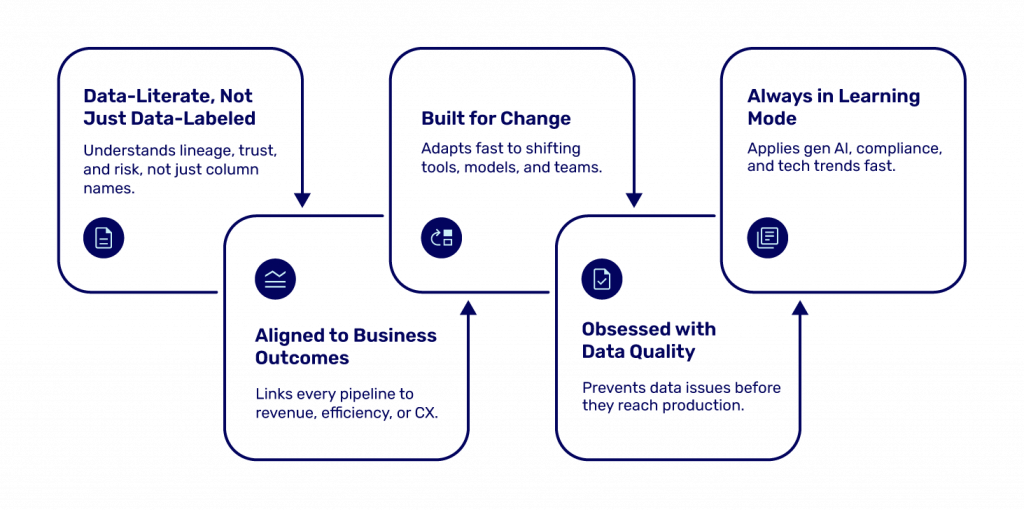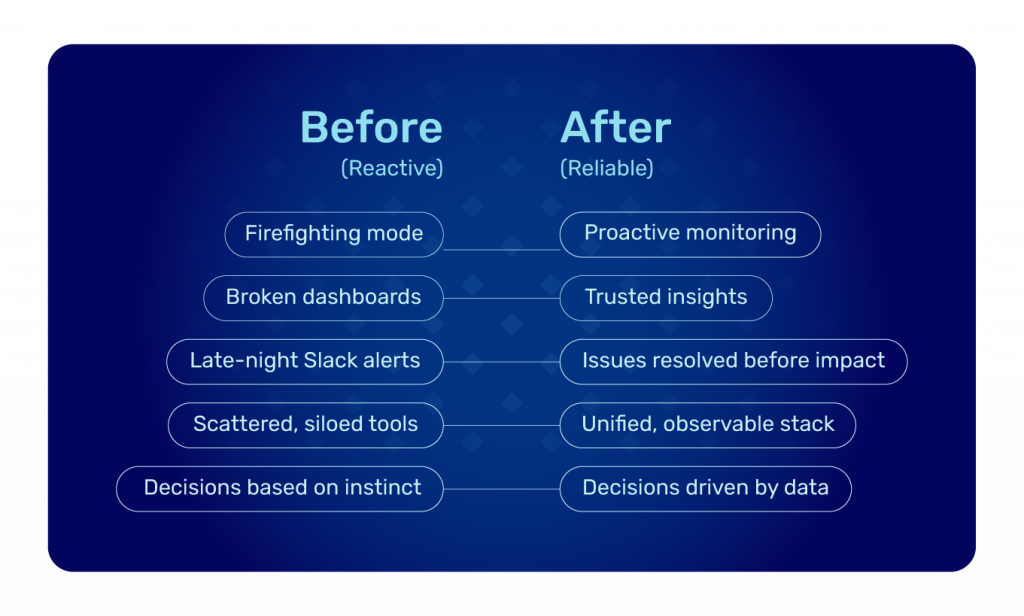It’s 2025, and data teams will no longer be just back-end enablers for sure. With the rise of generative AI and agentic systems, they’ll be core to building intelligent, autonomous applications and decision pipelines with a reliable data team.
Yet with great power comes great complexity. Broken pipelines, unreliable inputs, and delayed insights can cripple innovation. To stay competitive, enterprises need data teams that are skilled and deeply reliable:

Building a Reliable Data Team
Here are practical, modern strategies for building a future-ready data team.
1. Start with a Clear, AI-Aligned Data Strategy
Your strategy should serve as your guiding north star, informing every data decision and driving business impact.
- Align With Business Goals
Ensure that your data team’s efforts directly support the enterprise’s goals. Whether scaling AI-ready personalization or streamlining supply chains, the data strategy should align with the real-world business impact. - Define KPIs for Data Success
To evaluate the team’s contribution, use measurable outcomes like data freshness SLAs, incident reduction, or improved model accuracy.
- Prioritize Governance and Compliance
Data used in LLMs and agentic systems must meet standards for privacy, bias, and lineage. Ensure policies are in place for secure and ethical data usage.
2. Hire for Hybrid Skill Sets
Strong teams blend technical depth with business sense to tackle complex AI challenges.
- Look Beyond Technical Chops
You need engineers and scientists who can code and storytellers who understand business context and can debug ambiguous problems.
- Prioritize Adaptability Over Perfection
AI-native organizations evolve fast. Hire people who learn fast, ask questions, and iterate with ambiguity.
- Screen for Cultural Alignment
Technical brilliance alone won’t scale if your team doesn’t collaborate. Include culture-fit interviews to assess openness, ownership, and empathy.
3. Build a Culture of Collaboration
Collaboration turns scattered efforts into unified progress across the organization.
- Enable Cross-Functional Squads
Break silos between data, ML, product, and business. Let data teams work in pods embedded into domain teams.
- Use Shared Dashboards and Metrics
Data quality is everyone’s problem. Shared data observability tools and collaborative data contracts help surface and resolve issues early.
- Incentivize Joint Problem Solving
Celebrate wins across functions, not just individual technical achievements. This builds trust and shared accountability.
4. Modernize Your Data Stack
The right stack transforms data chaos into scalable insights.
- Adopt Tools Built for Observability and Automation
From lineage-aware orchestration (like Dagster) to reliability-focused platforms (like Qualdo), invest in tools that catch errors early and reduce manual firefighting.
- Enable Self-Service Without Losing Control
Use access-governed sandboxes and no-code interfaces for experimentation, while maintaining centralized governance.
- Automate Wherever Repetition Exists
AI-native teams automate data checks, anomaly detection, pipeline recovery, and reporting. Free up time for strategic work.
5. Champion Continuous Learning
A learning mindset keeps your team agile and ready for emerging AI demands.
- Make Learning a Priority, Not a Perk
Allocate dedicated hours for technical training, conferences, or exploring GenAI workflows. Include this in OKRs.
- Facilitate Internal Knowledge Sharing
Set up recurring internal demos or lightning talks. Let team members teach each other the tools, findings, and lessons learned from failures.
- Promote Mentorship at All Levels
Pair junior talent with senior team members. Peer mentoring is just as effective for upskilling and team cohesion.
6. Data Quality & Reliability Is the Baseline, Not a Bonus
Trustworthy data underpins every AI success story, from daily ops to strategic bets.

- Monitor the Health of Your Data Assets
Use tools like Qualdo-DRX to monitor your data ecosystem for anomalies, freshness, schema drift, or missing values.
- Design for Observability from Day One
Logging, tracing, and alerts should be native to every pipeline. Treat data like software with real-time observability.
- Make Reliability Metrics Visible
Track and report on downtime, incident resolution time, data freshness, and accuracy. It keeps teams aligned and stakeholders confident.
7. Lead with Vision and Empathy
Strong leadership connects data strategy with human-centered execution.
- Set the North Star
Define what success looks like for the data team within the broader business and AI goals context. Communicate it often.
- Support Psychological Safety
Teams need space to fail, learn, and iterate. Encourage experimentation while holding space for accountability.
- Balance Stakeholder Demands
It’s tempting to react to every request. Great data leaders prioritize what matters most and protect team bandwidth.
Conclusion
Reliable data teams will be the foundation of every AI-driven enterprise in 2025. They don’t simply fix pipelines; they accelerate innovation, prevent reputational risks, and unlock exponential value. Investing in the right people, tools, and culture today is how you stay ahead tomorrow.
Looking to reduce manual effort completely? Wish to ensure your data team has the right tools to monitor and maintain data reliability? Qualdo.ai can help streamline your data observability, ensuring your data remains error-free, so your team can focus on what matters most.



